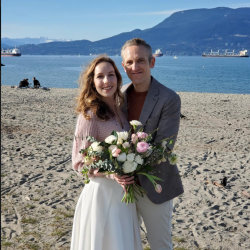
Recently, an article showed up in my Facebook feed. It was titled, “That Discomfort You’re Feeling Is Grief,” and it included an interview with David Kessler, the man responsible for popularizing the concept of the five stages of grief. According to Kessler, many of us are experiencing unidentified symptoms of grief during this pandemic. The same sentiment appeared again and again in the comments: “I finally understand what I’m feeling!”
But I didn’t need an article to help me understand my experience. I knew I was grieving.
For the past five years, I have been working towards earning a graduate degree in theology. It’s difficult to quantify this undertaking. I’ve lost track of the number of sleepless nights endured, cups of coffee imbibed, Greek and Hebrew verbs conjugated, pages typed, and tears shed along the way. On May 1st I was supposed to walk across a stage and receive my MDiv. When I read the email from the college informing me that convocation was canceled, I was faced with the loss of celebration and closure.
I was heartbroken, but I told myself, “I can get over this.”
Convocation wasn’t the only significant event on my calendar, however. For the past year I’ve been planning my wedding. If you have ever been a bride, or known a bride, then you will understand that the effort I put into my studies pales in comparison to the effort I put into my wedding. On May 16th I was supposed to walk down the aisle and exchange vows with my fiancé in front of our families and friends. When I heard that gatherings of more than five people were banned, I was faced with the loss of irreplaceable moments and memories.
I was devastated, and I asked myself, “Can I get over this?”
As I sit here now, reflecting on the past month as a graduate and a newlywed, I realize that the goal is not to “get over” these losses. They will always be a part of my story. Instead, I am learning to live with the simultaneous realities of grief and joy. There are days when I cry, and days when I am blissfully happy. Both kinds of days are okay.
I’m also discovering unexpected gifts in the midst of this season. 1 Corinthians 12 talks about the body of Christ—a concept I have always found abstract, despite my studies. What does this “we’re all members of one body” stuff really mean? Yet as I have processed recent events, one thought has consistently encouraged me: I am not the only person going through this. Somehow, the knowledge that I am connected with others who are grieving the same losses helps me feel understood, less alone, and part of something that is bigger than me. The concept of belonging to the body is less abstract, and I am growing in gratitude for my community.
Sanctuary Mental Health Ministries has a great small-group resource for individuals, like me, who are processing grief. Participants are invited to watch a series of short films, read the accompanying discussion guide, and engage in some of the most pressing questions raised by this pandemic: How do we understand grief as people of faith? How can we support vulnerable and grieving members of our community? How can we sustain our hope and joy?
For more information, check out “Faith, Grief, and COVID-19: A Conversation” on the Sanctuary website.
Jane Born is a recent graduate of Regent College, where she completed an MDiv with an emphasis on mental health and spirituality. Jane has been involved in ministry for over a decade, and she currently serves as the Program Development Coordinator for Sanctuary Mental Health Ministries.






